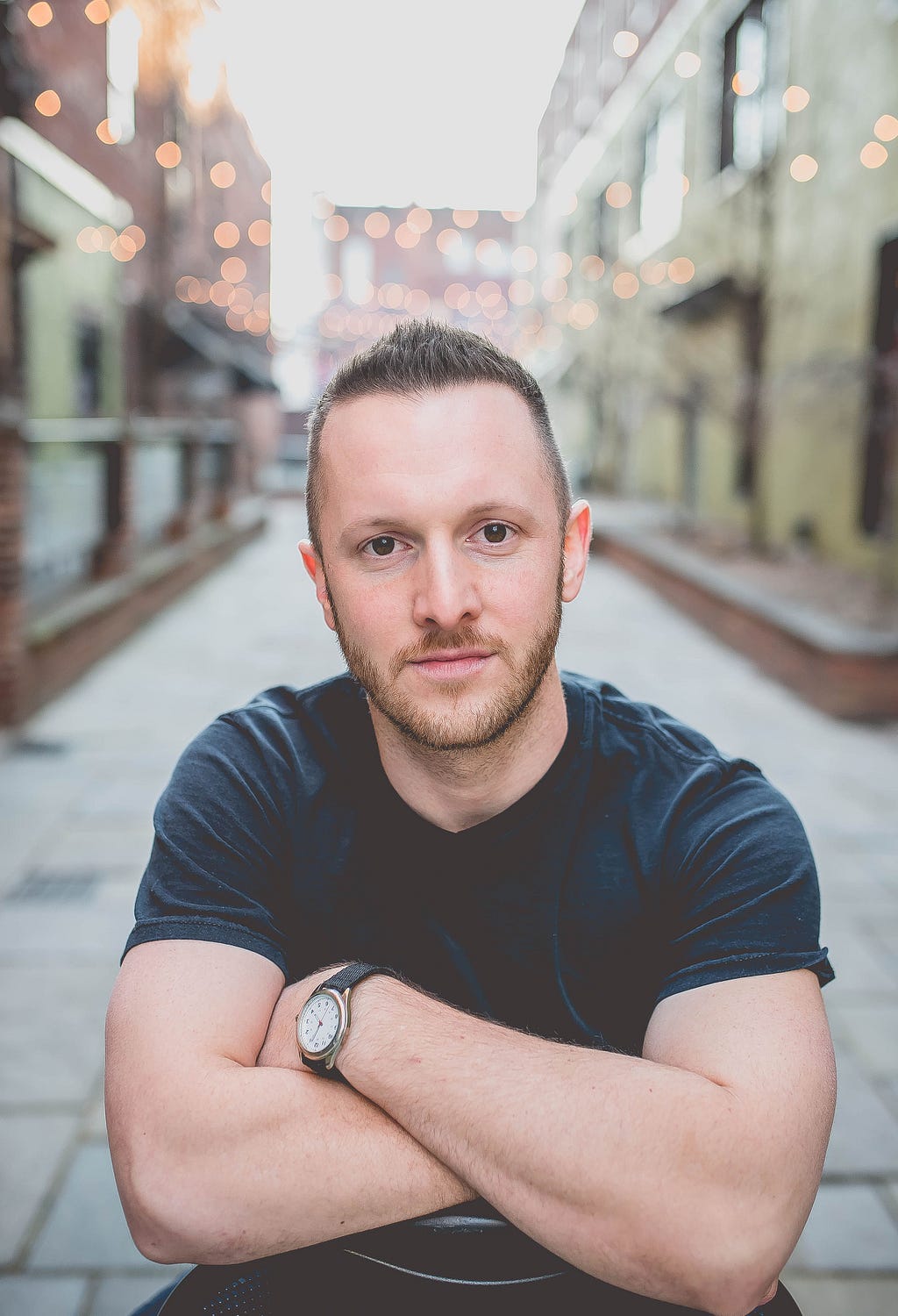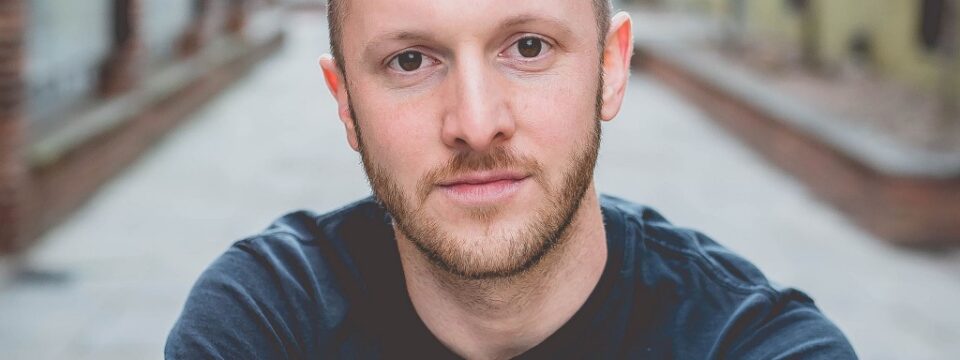Social Impact Authors: How & Why Author Tyler James Russell of Unsolicited Press Is Helping To Change Our World

Sometimes, it is a fight to maintain hope. It can feel like there is so much resistance to fighting something so obviously and inherently and simply evil. For me, it is an act of something like faith to continue and believe that things really do “bend toward justice.
As part of my series about “authors who are making an important social impact”, I had the pleasure of interviewing Tyler James Russell.
Tyler James Russell is the author of When Fire Splits the Sky (2022), a novel, and To Drown a Man (2020), a poetry collection, both from Unsolicited Press. An educator of ten years, he lives in Pennsylvania with his wife Cat and their children. His writing has been nominated for the Rhysling and Best of the Net, and has appeared or is forthcoming in Asimov’s Science Fiction, F(r)iction, Janus Literary, and the NonBinary Review, among others, and can be found at TylerJamesRussell.com.
Thank you so much for joining us in this interview series! Before we dive into the main focus of our interview, our readers would love to “get to know you” a bit better. Can you tell us a bit about your childhood backstory?
My childhood feels made up of a number of distinct threads woven together, and it’s the braided-together interconnections of those things that have fascinated me now, looking back. Sports were a big part of my growing up, particularly baseball, as well as libraries and books. That alone, at times, felt like being torn in two different directions, but I think there’s a lot as an author to be learned from the simple dedication and work of athletics.
The more compelling strand to me, however, was how an early love of fantasy intersected with a pretty conservative, Evangelical upbringing. While I’ve definitely moved away from the Evangelical side of that (as I think you can see in the book), the haunting idea of the unseen and the supernatural has really stuck with me in a powerful way.
When you were younger, was there a book that you read that inspired you to take action or changed your life? Can you share a story about that?
Every book I’ve ever read has changed my life in some way, I’d say. These kinds of things become part of you. But Child of God by Cormac McCarthy stands out as an early example. It’s a horrific story, and the demands of the text are at times nearly unbearable, but I think the central feeling of asking you to hold in one hand the horror a human is capable of and in the other some measure of empathy has definitely stuck with me.
It has been said that our mistakes can be our greatest teachers. Can you share a story about the funniest mistake you made when you were first starting? Can you tell us what lesson you learned from that?
One of my first stories, a piece of Star Wars fan fiction written when I was in 4th grade or so, had most of the Star Wars characters saying their lines in unison, like six at once. Reading it back, it made me realize that the utter freedom of writing fiction meant I had to actually, you know, learn some things.
Can you describe how you aim to make a significant social impact with your book?
Put simply: I’d like one person to read this book and then not commit sexual violence or abuse. Or, I’d like one survivor to read this and feel seen.
Can you share with us the most interesting story that you shared in your book?
There are some pretty harrowing moments in this story that involve abuse and trafficking, and there were many times writing and researching and interviewing where I felt just wrecked as a human being living in a world where this happens. One story in particular, given to me in an interview, I knew would be the inspiration for a key flashback, but I also knew the true story would seem almost too horrific to be believable for a fictional audience. Realizing I was going to have to actually tone down abuse in a fictional narrative to keep it believable was tough.
What was the “aha moment” or series of events that made you decide to bring your message to the greater world? Can you share a story about that?
I’m a teacher as well as an author, and one thing I always push my students to do is to write what seems most meaningful to them, rather than thinking about what an imaginary market or readership might want. I show the clip from Walk the Line when the producer asks Johnny Cash what song he’d sing if he was dying in a ditch, and he only had that one chance to sing “one song that would let God know how you felt about your time here on Earth,” and talk about Annie Dillard’s quote about what you would write if you knew that you were dying. After a few years of this, I realized I wasn’t following my own advice, and started When Fire Splits the Sky.
Without sharing specific names, can you tell us a story about a particular individual who was impacted or helped by your cause?
The book isn’t being published until November (it’s September right now), but it’s gone through rounds of editing and beta-readership and portions of it made its way through MFA workshops, and I’ve had lots of people share that it’s impacted them in some way, including one person who was partners with someone who had DID. That’s meant a lot to me, regardless of what kind of readership this finds. Laura Davis, a survivor and author of The Courage to Heal, read it and offered some really kind words about it. That meant the world to me.
Are there three things the community/society/politicians can do to help you address the root of the problem you are trying to solve?
There are so much that needs to change at an institutional level in order for us to fight trafficking and make our society a safer place at every level, especially for children. Organizations like Polaris are experts in this arena, and I think the best use of our energy is to throw our weight behind existing experts in the fight.
My work is more on the micro-level. I wrote a poem — “Traffick for Miles,” first published in Janus Literary — about trying to reckon with the sheer numbers of trafficking victims, and ultimately being unable. The only way to even begin to understand is to focus on a single individual. I want to help people understand the way trauma impacts a person, the ripple effect of abuse, and the way a person can begin the process of personally changing. Understanding things like ACEs, complex trauma, and PTSD are key to empathetically and compassionately living in a world where so many people have experienced trauma as children, and/or love those who have.
How do you define “Leadership”? Can you explain what you mean or give an example?
To me, leadership is a commitment of not pouring more pain into the world. It’s an attitude of hard-working humility in service of other people. I think it’s easy to become a leader for self-serving reasons, be that money or power or just the psychological dopamine rush of being important and special and key. I think the most heroic leaders are the ones who work hard at resisting this, and stay committed to a good cause that supersedes their own ego.
What are your “5 things I wish someone told me when I first started” and why. Please share a story or example for each.
- Practice self-care. The work of fighting for any social change is hard, and especially in a world as fractured as ours today, it’s easy to burn out. I didn’t understand this for years.
- As far as writing goes, it’s never going to be good the first try. Or the second. In fact, it’s very rare that I write something on a blank page and I think, “That’s great!” Instead, the process is really a long iterative process of changing existing writing until, gradually, it begins to actually work.
- Research. Then research more. Dig into reliable, robust sources. This has been a product of many, many years for me. There are so many harmful misconceptions out there — especially around topics like trauma and DID. To avoid the hard work of researching is to pour more harm into the world.
- Listen. It’s a lost art today, but the power of listening to the stories of others — of creating space to honor that — has been transformative in my own life.
- Sometimes, it is a fight to maintain hope. It can feel like there is so much resistance to fighting something so obviously and inherently and simply evil. For me, it is an act of something like faith to continue and believe that things really do “bend toward justice.
Can you please give us your favorite “Life Lesson Quote”? Can you share how that was relevant to you in your life?
I mentioned it earlier, but Annie Dillard’s work on writing and living out of a place of fullness and courage has been important to me. Her exact quote is: “Write as if you were dying. At the same time, assume you write for an audience consisting solely of terminal patients. That is, after all, the case. What would you begin writing if you knew you would die soon? What could you say to a dying person that would not enrage by its triviality?” It’s been really important writing advice to me, but even moreso living advice. Some people find it a little dark, but I find it sharpens me, and keeps me focused on what actually, in the long run, matters.
Is there a person in the world, or in the US with whom you would like to have a private breakfast or lunch with, and why? He or she might just see this, especially if we tag them. 🙂
Oh boy, that’s such a good question. I’m going to say Matt Bell, who I’ve met briefly, but who I respect so much as an author and teacher and just a person of general warmth and goodness in the public space.
How can our readers further follow your work online?
You can do a quick Google search to find a lot of my recently published work, but it’s all collected at TylerJamesRussell.com. And I’m also on Twitter @Tjamesrussell.
This was very meaningful, thank you so much. We wish you only continued success on your great work!
Social Impact Authors: How & Why Author Tyler James Russell of Unsolicited Press Is Helping To… was originally published in Authority Magazine on Medium, where people are continuing the conversation by highlighting and responding to this story.
